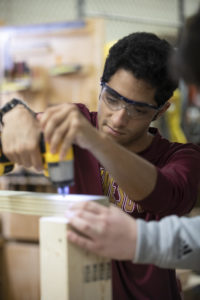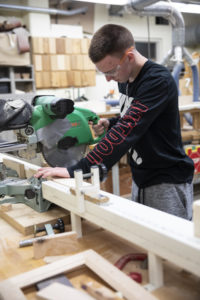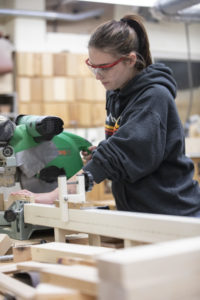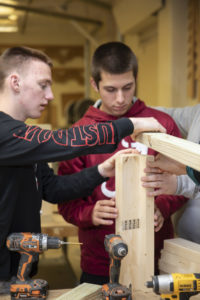In Building Solar-Powered Ice Fishing Houses, Mounds View District High School Students Gain Real-Life Construction Experience (and College Credit!)
Across the United States, high schools have responded to the needs of high achieving high school students by offering numerous opportunities to earn college credits, from AP and IB courses to partnerships where students are taught entry-level college courses in the high school.

For the most part, college credit is geared to students who plan to attend a liberal arts college or university, with courses being offered in subjects such as biology, calculus, world history, or a language, such as Spanish, French or German.
Often overlooked are students who intend to take a different path with their lives following high school. Students who dream of working with both their minds — and their hands – in construction-related careers such as plumbing, pipefitting, welding or ironworking.
Fortunately, that gap in educational opportunities for some high school students is changing. And a good example of this is the Construction and Solar Energy pathways program offered through Mounds View Public Schools (District 621). The program is available to both students of Irondale High School and Mounds View High School, the two public high schools within the 621 District.
“Several years ago, we realized we needed to offer opportunities for our students to learn more about high-demand, high-wage jobs in the construction-related trades,” says Michael Werner, Mounds View School District’s Coordinator of Post-Secondary Planning. “By partnering with the Minnesota State Colleges and University (MnSCU) system, we now not only offer opportunities to begin learning a trade, but a process that allows them to earn credit toward a two-year or four-year degree.”
“In other words, we’re creating more options for our students – they can either pursue a career in construction immediately out of high school, or they can enter a Minnesota state college or university, or both,” Werner says. “More options is a good thing for students who are trying to discern a future career path.”

One such opportunity being offered to students attending the district is the Construction and Solar Energy course. The two-hour, one semester course (September through January) taught by instructor Mark Ahlers, allows students to learn and work together to build a solar-powered ice fishing house that meets real-life building codes.
“Any student in grades 10 through 12 can take the course and learn skills such as basic plumbing, how to produce technical drawings, read building plans, build models/prototypes, and develop safe working practices,” says Werner. “While at the same time, earning credit that can be applied at Century College, one of 30 state colleges and seven universities that comprise MnSCU.
What evolved from a conventional wood construction class has turned into a partnership between the Mounds View School District, Century College, the Minnesota State Energy Center of Excellence, the St. Paul Building Trades Council, the Minnesota Trades Academy, and Construction Careers Foundation. Through this partnership, students have access to a mobile classroom focused on alternative energy along with the solar lab at Century College.
“The St. Paul Building Trades, Construction Careers Foundation, and the Minnesota Trades Academy have been instrumental in helping Irondale develop this class and curriculum,” says Werner.
“We’re proud to have had a hand in crafting this very special program at Irondale,” says Don Mullin, executive secretary of the St. Paul Building and Construction Trades Council. “The Mounds View school district is doing an amazing job and this program is making a difference in the lives of young people. There is a huge appetite at high schools across our state for programming similar to what Irondale has achieved.”

As part of the MULTI-CRAFT CORE CURRICULUM, students learn from solar installation companies that send representatives to share information and insight about installing solar energy systems. In working with solar installation companies, students gain knowledge about the basic components of a solar energy system, such as how energy works, how to prep for solar panel installation, and how to calculate the cost and the return on investment (ROI) for solar energy systems.
In addition, students participate in fieldtrips outside of class through organizations such as Construct Tomorrow, the Electrical Joint Apprenticeship Training Committee, and Cummins, a manufacturer of engines used in the construction industry. In the future, the high school would like to invite more building trades professionals to come into the classroom and share their insights about careers in construction.
By mid-January, the students will complete their solar-powered ice-fishing house and will sell it to purchase materials needed for program’s next building project. The ice fishing house will likely be sold through an auction.

Building Pathways to the Future
The Construction and Solar Energy class is one of six courses that Mounds View Public Schools recommends as part of its Construction and Solar Energy pathway, a series of courses to prepare students for a future career in the construction industry. The Construction and Power pathway is one of five pathways offered by the school district developed to prepare students for future careers. Those pathways include: Automotive, Business, Engineering & Manufacturing, Construction and Solar Technology, and Liberal Arts.
The other courses within the Construction and Solar Technology pathway series include:
- Intro to Engineering Design I and II
- Computer Integrated Manufacturing
- Digital Electronics
- Engineering and Manufacturing I, II and III
- Welding
Students are encouraged to take a number of general education courses to complement what they’ll be learning in the Construction and Solar Energy pathways program. These courses include:
- ARCC Communications Studies
- ARCC College Writing or AP Lang/Comp or CIS Comp
- ARCC Physics
- ARCC Biology
- ARCC College Algebra
- Energy Concepts
By entering into the Construction and Solar Energy pathway, students start to understand the importance of other subjects such as math or communications to a career in construction.
“Like every other high school in America, we hear students lament, “Why am I studying algebra? How am I going to use it in the real world?” says Werner. “Then they start to get into our Construction and Solar Energy program or our Welding program and begin realize how important math really is to the success of their project.”
“One of the aspects that I like about the program at Irondale is that students see the connection between a career in construction and classes such as math or writing,” adds Mullin. “Math is used by skilled trades professionals every day on the job. Communications is critical to ensuring that everyone on a project team is doing what they should be doing at the right time. The beauty is that in the Construction and Solar Energy class, the students get to see how math is applied in real life. That’s powerful.”
The Construction and Solar Energy program has articulation agreements for courses within the Solar Pathway program at Century College. Articulation agreements allow students to apply credits earned in specific courses in high school toward a degree at Century College.
In addition, students who would like to complete an associate of sciences degree in the Solar Power track at Century College have the opportunity to take additional college courses that meet general education requirements prior to high school graduation, including Anoka-Ramsey college courses in college writing, communications, physics, biology, and college algebra.
“It’s important that students not only pick up valuable skills and earn college credit, but that they recognize construction as a legitimate alternative to college or the military,” says Werner. “Our focus is on letting students experience these types of opportunities before they graduate.”
To learn more about high schools that offer construction-related programs, visit https://constructioncareers.org/careers.
